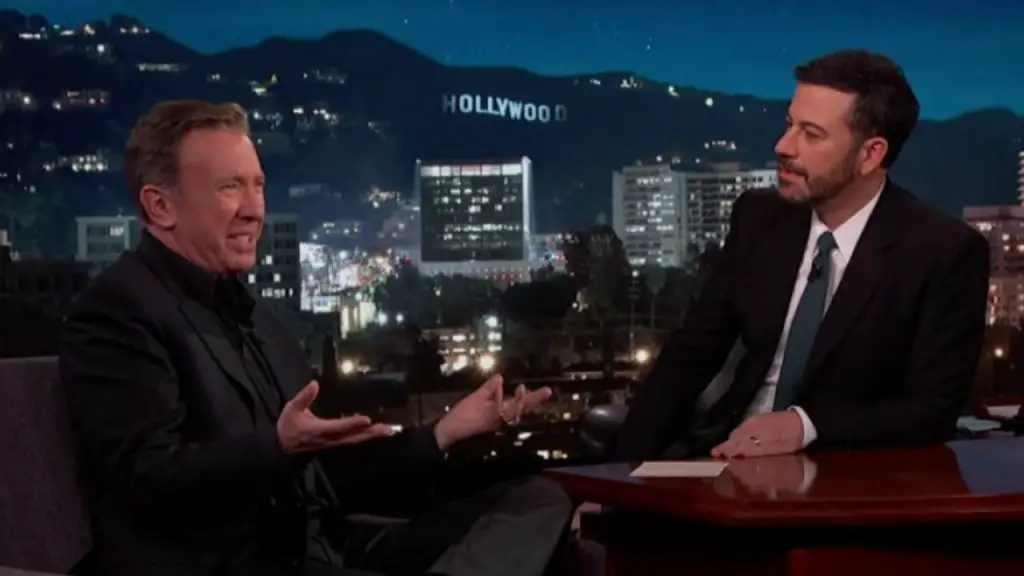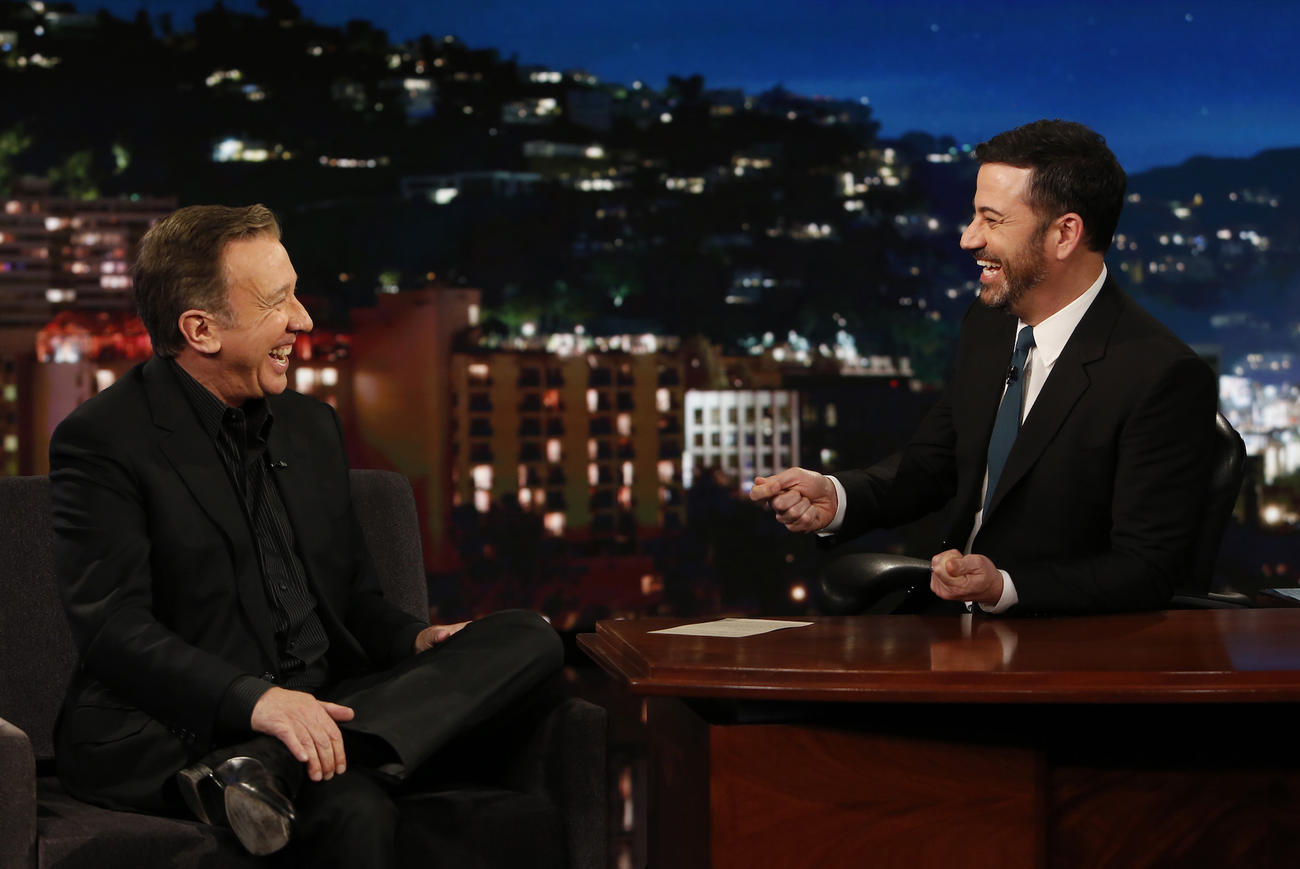A disturbing trend is emerging among some of the Hollywood elite—reactionary, outspoken insensitivity.
Last week, on “Jimmy Kimmel Live!” Tim Allen, actor from “Toy Story,” “The Santa Clause” and most recently “Last Man Standing,” compared being a conservative in Hollywood to being in 1930s Germany. Based on a basic understanding of history, it’s fair to say that he equated himself to being like a Jewish person living in a ghetto.
The comparison is repulsive, absurd and intolerant. Because Allen is a celebrity and is saying something taboo, though, he gets a free pass. Try to defend it, but all in all, he compared having someone disagree with him to one of the worst genocides in human history. And Jimmy Kimmel and the audience laughed all the way through it.
In this situation, your own political beliefs don’t matter, whether liberal or conservative, Republican, Independent or Democratic. The comparison is vile. As a decent person, you have to recognize when jokes or commentary go too far.
In the same sentence, Allen did almost everything a person shouldn’t do in a debate or an educated dialogue if they want to speak constructively. First, he trivialized a historical event that caused the deaths of more than fifteen million people, and he was not the least apologetic for it.
If he wanted to have ongoing political dialogues, which he seemed to claim in the video, making light of a traumatic experience, especially one that still affects so many people today, is insensitive and is a good way to alienate people.
In fact, the Anne Frank Center for Mutual Respect asked Allen to apologize for his comments, calling them deeply insensitive. The center’s director spoke the truth; what conservative celebrities face in Hollywood today is not even close to what the Jewish people and other groups suffered in Nazi-controlled Germany.
So far, he’s not off to a great start.
Next, and without a hint of irony in his voice, Allen used his late-night platform to do exactly what he criticized liberals for doing. Instead of taking the time to formulate a detailed argument, he generalized his opponents as “liberals,” lumping together everyone, from moderate democrats to far leftists, in one vague group.
Usually, in a constructive dialogue, it’s helpful to focus on specific people or actions that you find disagreeable. Instead, Allen thought a political buzzword was enough of an explanation. Finally, he created an “us vs. them” mentality with his comments. Although Allen didn’t directly name his opponents, he created an inner group of persecuted conservatives.
Creating small, closed-off groups can foster a mob mentality and make it easier for people to ignore different opinions. When people feel like they’re constantly attacked and silenced, they may act out in hostile or dangerous ways.
If Allen really wanted to have a productive conversation with one of his political opponents, it may have sufficed that he had some concrete policy goals or specific items in mind, or at the very least, extended an olive branch their way. No, his comments were intended only to tear people down, not to have an intelligent discussion.
At this point, Allen’s supporters would say, “Hey, it’s not his fault that everyone is so sensitive. He’s just telling it like it is. He’s just being politically incorrect” etc.
But, “political correctness” and “political incorrectness” have no set definitions. The latter is used online as a tool to defend opinions that are almost discriminatory and disparaging, if not downright sexist or racist.
Political incorrectness is one of the hallmarks of public figures like Milo Yiannopoulos, Tomi Lahren, Alex Jones and Donald Trump. What these people have in common, though, is that when they speak, their “politically incorrect” remarks should not be respected in a political dialogue. They make claims, like a trans person is just “a man in a dress,” or Black Lives Matter is the new Ku Klux Klan.
Celebrity personalities do the same thing that Allen did, but they do it in their podcasts, web-series and on the national stage. These amateur politicians generalize, criticize and portray themselves as martyrs when someone disagrees with them, all while offering no solutions of their own.
In the mainstream media, political incorrectness has no purpose other than to defend opinions that should rightfully be shunned from debate. Concepts like human rights, anti-discrimination and civil liberties cannot be challenged or compromised in any form. Wars were fought and legal precedents created specifically to protect these freedoms.

Political incorrectness aside, Tim Allen is one in a long line of celebrities speaking out in alarmingly reactionary manners. This isn’t to say that celebrities shouldn’t engage in the political sphere. They have as much a right to do so as anyone else, being citizens of the United States.
But when someone like Shaq is interviewed and claims that the Earth is flat (even if he later claimed he wasn’t serious) or when Jim Carrey protests vaccines online, you have to ask, at what point are people willing to put up with disproven, unsupported and sometimes dangerous opinions?
Celebrities hold massive amounts of political and social weight in the United States, so when one of them spouts off an unscientific opinion for attention, a lot of people are going to listen.
Because people have a tendency to believe what they hear, misinformation can spread like wildfire. Celebrities should be involved in politics, but, like everyone else, they need to think through their opinions.
It’s a shame to say this, but domestic and global politics are living in the age of the alternative fact. It doesn’t matter what objective truth is. The president can tweet that his office has been wiretapped, people can deny that the Holocaust happened or claim that one race is inferior to another.
Because there are people who don’t care about the truth, it’s not enough to listen to what people say and trust them. It’s more important than ever to research the real facts, question authority and think critically about every piece of information you see.
The best way to counteract misinformation is not to get angry and shout or type in all caps, but to get to the bottom of news stories and educate people.

















He’s a comedian and he’s speaking off the cuff. His intention didn’t seem to be anything to the degree he is being scrutinized for. Everyone needs to take a break from judging one another. It’s exhausting.